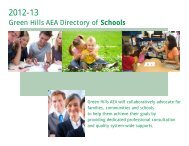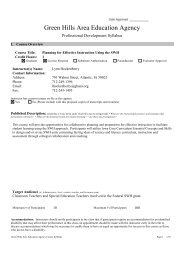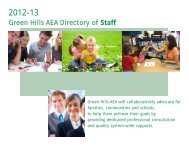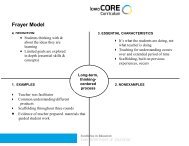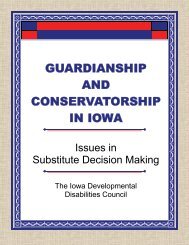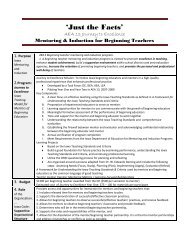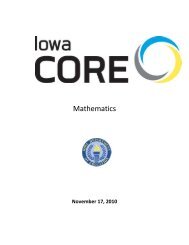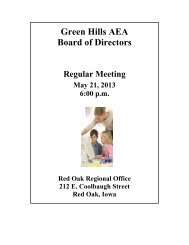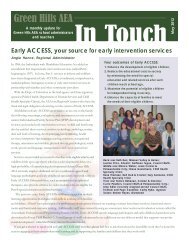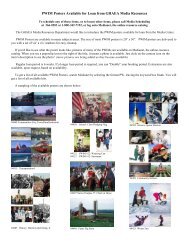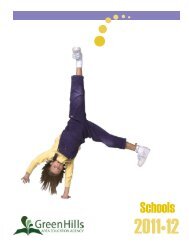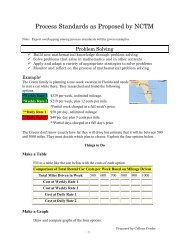Mission Vision Guiding Principles Beliefs - Green Hills AEA
Mission Vision Guiding Principles Beliefs - Green Hills AEA
Mission Vision Guiding Principles Beliefs - Green Hills AEA
Create successful ePaper yourself
Turn your PDF publications into a flip-book with our unique Google optimized e-Paper software.
Online Databases<br />
GH<strong>AEA</strong> purchases subscriptions to online databases for<br />
students and educators to use at school and at home.<br />
These databases provide a wealth of instructional<br />
resources for classroom use. <strong>AEA</strong> financial support of<br />
these databases assures that all students and educators in<br />
GH<strong>AEA</strong> will have access to these resources. Databases<br />
available are: EBSCO, AccuWeather, AP Multimedia,<br />
World Book, Atomic Learning, United Streaming SIRS,<br />
Clipart.com and PD360. Contact the <strong>AEA</strong> Media Center<br />
for access information.<br />
Deanna Etherington and Julia Hood,<br />
Halverson Center<br />
Options to Anger<br />
• See Community-Youth Connections<br />
Orientation and Mobility<br />
Specialists are available to train students with visual<br />
impairments in how to travel and be independent in their<br />
daily routines.<br />
Cal Sinn, Peterson Regional Office<br />
Call any GH<strong>AEA</strong> regional office<br />
P<br />
Paraeducators<br />
<strong>Green</strong> <strong>Hills</strong> <strong>AEA</strong> is an approved provider for the<br />
Paraeducator Generalist Certificate. This certification is a<br />
voluntary program supported by the Iowa Board of<br />
Educational Examiners and Iowa Department of<br />
Education. The certificate requires successful completion<br />
of 90 clock hours of training in the areas of behavior<br />
management, exceptional child and at-risk behavior,<br />
collaboration skills, interpersonal relation skills, child and<br />
youth development, technology and ethical<br />
responsibilities and behavior.<br />
Michelle Lidgett, Glenwood Regional Office<br />
Kathy Lockard, Creston Regional Office<br />
Parent Educator Connection<br />
The Parent Educator Connection (PEC) is a support<br />
network between families and educators for the<br />
education and well-being of children/young adults with<br />
special needs. The focus of this statewide program is to<br />
assist in the transition of children from Early ACCESS<br />
services (birth to three) to Part B special education<br />
services (three to 21); and the transition of high school<br />
students to post high school activities in the areas of<br />
living, learning and employment. Assistance is provided<br />
through collaboration with other agencies, gathering and<br />
sharing information, and reviewing research-based<br />
12<br />
practices and evaluating their effectiveness. The PEC<br />
library is available to teachers and/or parents. It is<br />
housed within the <strong>AEA</strong> professional library and can be<br />
accessed through Medianet, the <strong>AEA</strong>’s online ordering<br />
system. The collection includes disability specific books,<br />
informational “toolkits” and reference books pertaining<br />
to special education.<br />
Michele Harrison, Peterson Regional Office<br />
Kyla Alba, Halverson Center<br />
Amy Liddell, Red Oak Regional Office<br />
Physical Therapy<br />
Physical therapists provide services to infants who have<br />
or are at risk for developmental delays and to school age<br />
students who have motor delays that impact access and/<br />
or participation in their educational setting. Physical<br />
therapists collaborate with parents and school teams to<br />
provide strategies and suggest equipment that maximize<br />
function in the home (Early ACCESS) and school<br />
settings.<br />
Andy Ruff and Julie Stessman, Peterson Regional<br />
Office<br />
Positive Behavior Instructional Supports<br />
Positive Behavior Instructional Supports (PBIS) is a<br />
school improvement process intended to increase the<br />
capabilities of Iowa schools, families and communities to<br />
enhance the social, emotional, behavioral and intellectual<br />
development of students.<br />
Kerry Aistrope, Red Oak Regional Office<br />
Kathy Lockard, Creston Regional Office<br />
Posters and Signs<br />
• See Copy Center<br />
Prevention Specialists<br />
Prevention specialists work with schools and community<br />
groups to decrease community/school risk factors that<br />
contribute to youth engaging in unhealthy or risky<br />
behaviors, particularly the use of alcohol, tobacco and<br />
other drug use. They also work to promote caring adults,<br />
safe neighborhoods and communities, healthy start and<br />
future, marketable skills through effective education and<br />
opportunities to serve others for all youth and their<br />
families.<br />
Carol Johnson, Halverson Center<br />
Prevention Specialists for Mentoring<br />
Prevention specialists for mentoring collaborate with<br />
local community groups to match at-risk youth with<br />
positive role models. They recruit mentors, match<br />
mentors and mentees, monitor the matches, and provide<br />
support. Mentors may mentor during school hours<br />
(school-based) or outside of school hours (communitybased).<br />
Carol Johnson, Havlerson Center



